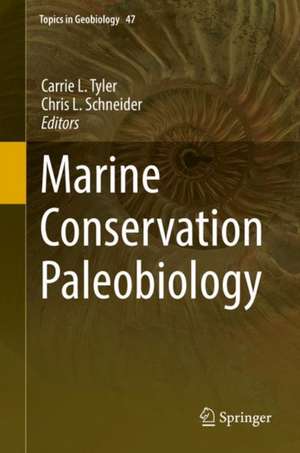Marine Conservation Paleobiology: Topics in Geobiology, cartea 47
Editat de Carrie L. Tyler, Chris L. Schneideren Limba Engleză Hardback – 7 mai 2018
| Toate formatele și edițiile | Preț | Express |
|---|---|---|
| Paperback (1) | 780.19 lei 43-57 zile | |
| Springer International Publishing – 30 ian 2019 | 780.19 lei 43-57 zile | |
| Hardback (1) | 786.18 lei 43-57 zile | |
| Springer International Publishing – 7 mai 2018 | 786.18 lei 43-57 zile |
Din seria Topics in Geobiology
- 18%
 Preț: 1858.10 lei
Preț: 1858.10 lei - 20%
 Preț: 822.08 lei
Preț: 822.08 lei - 15%
 Preț: 672.43 lei
Preț: 672.43 lei - 18%
 Preț: 1236.82 lei
Preț: 1236.82 lei - 15%
 Preț: 647.59 lei
Preț: 647.59 lei - 24%
 Preț: 885.02 lei
Preț: 885.02 lei - 18%
 Preț: 951.59 lei
Preț: 951.59 lei - 18%
 Preț: 964.23 lei
Preț: 964.23 lei - 18%
 Preț: 1117.69 lei
Preț: 1117.69 lei - 15%
 Preț: 633.31 lei
Preț: 633.31 lei - 18%
 Preț: 966.27 lei
Preț: 966.27 lei - 18%
 Preț: 952.54 lei
Preț: 952.54 lei - 18%
 Preț: 949.85 lei
Preț: 949.85 lei - 18%
 Preț: 1013.50 lei
Preț: 1013.50 lei - 24%
 Preț: 821.17 lei
Preț: 821.17 lei - 18%
 Preț: 952.40 lei
Preț: 952.40 lei - 18%
 Preț: 961.23 lei
Preț: 961.23 lei - 18%
 Preț: 952.26 lei
Preț: 952.26 lei - 18%
 Preț: 960.42 lei
Preț: 960.42 lei - 18%
 Preț: 1843.11 lei
Preț: 1843.11 lei - 18%
 Preț: 954.31 lei
Preț: 954.31 lei - 18%
 Preț: 1256.41 lei
Preț: 1256.41 lei - 18%
 Preț: 959.50 lei
Preț: 959.50 lei - 15%
 Preț: 673.60 lei
Preț: 673.60 lei - 18%
 Preț: 954.14 lei
Preț: 954.14 lei - 15%
 Preț: 640.06 lei
Preț: 640.06 lei - 18%
 Preț: 959.36 lei
Preț: 959.36 lei
Preț: 786.18 lei
Preț vechi: 958.76 lei
-18% Nou
Puncte Express: 1179
Preț estimativ în valută:
150.43€ • 157.49$ • 124.48£
150.43€ • 157.49$ • 124.48£
Carte tipărită la comandă
Livrare economică 07-21 aprilie
Preluare comenzi: 021 569.72.76
Specificații
ISBN-13: 9783319737935
ISBN-10: 3319737937
Pagini: 284
Ilustrații: XII, 261 p. 55 illus., 28 illus. in color.
Dimensiuni: 155 x 235 mm
Greutate: 0.56 kg
Ediția:1st ed. 2018
Editura: Springer International Publishing
Colecția Springer
Seria Topics in Geobiology
Locul publicării:Cham, Switzerland
ISBN-10: 3319737937
Pagini: 284
Ilustrații: XII, 261 p. 55 illus., 28 illus. in color.
Dimensiuni: 155 x 235 mm
Greutate: 0.56 kg
Ediția:1st ed. 2018
Editura: Springer International Publishing
Colecția Springer
Seria Topics in Geobiology
Locul publicării:Cham, Switzerland
Cuprins
An Overview of Conservation Paleobiology.- Should Conservation Paleobiologists Save the World on their Own Time?.- Conceptions of Long-Term Data among Marine Conservation Biologists and What Conservation Paleobiologists Need to Know.- Effectively Connecting Conservation Paleobiological Research to Environmental Management: Examples from Greater Everglades’ Restoration of Southwest Florida.- Using the Fossil Record to Establish a Baseline and Recommendations for Oyster Mitigation in the Mid-Atlantic U.S..- Coral Reefs in Crisis: The Reliability of Deep-Time Food Web Reconstructions as Analogs for the Present.- Exploring the Species-Area Relationship within a Paleontological Context, and the Implications for Modern Conservation Biology.- Refugia Past, Present, and Future: Lessons from Ancient Geologic Crises for Modern Marine Ecosystem Conservation.- Training Tomorrow’s Conservation Paleobiologists.- A Conceptual Map of Conservation Paleobiology: Visualizing a Discipline.
Notă biografică
Dr. Carrie L. Tyler is an Assistant Professor at Miami University in Oxford Ohio in the Department of Geology and Environmental Earth Science. Her research interests include processes governing the distribution, paleoecology, and evolution of marine invertebrates.
Dr. Chris L. Schneider is an Adjunct Professor at the University of Alberta in the Department of Earth and Atmospheric Sciences. Her research interests include carbonate stratigraphy and marine invertebrate paleoecology.
Textul de pe ultima copertă
This volume describes and explores the emerging discipline of conservation paleobiology, and addresses challenges faced by established and young Conservation Paleobiologist's alike. In addition, this volume includes applied research highlighting how conservation paleobiology can be used to understand ecosystem response to perturbation in near and deep time. Across 10 chapters, the book aims to (1) explore the goals of conservation paleoecology as a science, (2) highlight how conservation paleoecology can be used to understand ecosystems’ responses to crises, (3) provide case studies of applications to modern ecosystems, (4) develop novel applications of paleontological approaches to neontological data, and (5) present a range of ecosystem response and recovery through environmental crises, from high-resolution impacts on organism interactions to the broadest scale of responses of the entire marine biosphere to global change. The volume will be of interest to paleoecologists, paleobiologists, and conservation biologists.
Caracteristici
Defines the goals of conservation paleobiology, and highlights how it can be used to identify and understand marine ecosystem crises Provides case studies demonstrating the applications of conservation paleobiology in modern communities Encourages interdisciplinary dialogue and collaboration to maintain a productive marine biosphere
